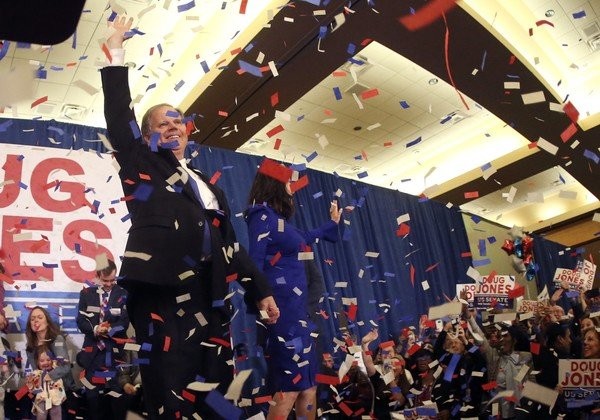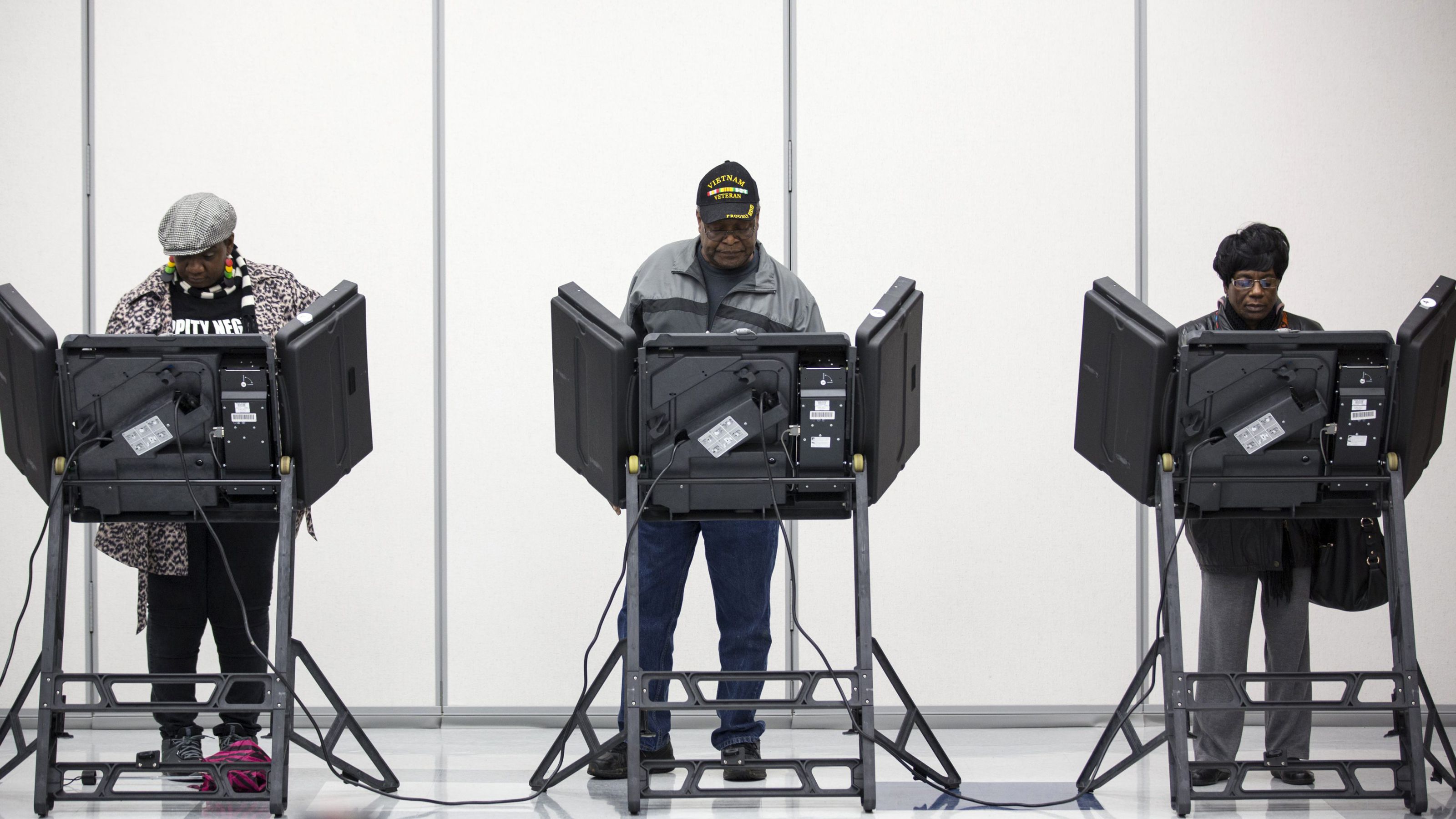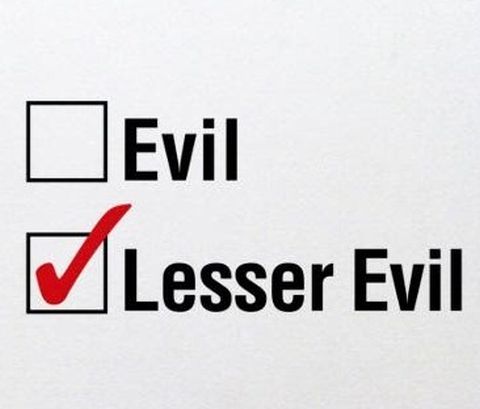Luke Pretz
January 3, 2018
Democrat Doug Jones’ narrow victory over the Trumpist Republican and accused pedophile Roy Moore in Alabama’s special Senatorial election caused a nationwide sigh of relief for leftists, liberals and some moderate Republicans “at least Alabama did not vote an accused pedophile into office.”
 Doug Jones celebrates victory. AP Photo/John Bazemore
Doug Jones celebrates victory. AP Photo/John BazemoreExit polls made one fact clear — Roy Moore’s loss was due in large part to the huge turnout of Black voters, especially Black women. Thirty percent of voters for this election were Black and Black voters overwhelmingly voted for Jones–98% of Black women (17% of the electorate) and 93% of Black men (11% of the electorate).
Black voters’ rejection of Roy Moore’s outright bigotry gave rise to a collective sentiment among leftists, liberals and some moderate Republicans: “Thank you Black women for saving us from Moore”.
Those activist groups who mobilized their communities to defeat Moore deserve the outpouring of gratitude that they have received. They overcame substantial obstacles, including voter suppression and other forms of institutional racism that systematically shut people of color out of the polling place. They also overcame an obstacle set up by the Democratic party itself: a centrist candidate who stands for the same neo-liberal policies that have benefited the wealthy and propertied at the expense of the working class, persons of color, the environment and the Global South.
The Alabama special election was unnervingly similar to two others that garnered national media attention this year– the At-Large Congressional district race in Montana and the Sixth Congressional District race in Georgia– both won by the Republicans. These Republican victories raised legitimate concerns that Moore would win in Alabama. In all three races, the Democratic Party fielded centrist Democrats, (though Montana’s Democratic candidate, Rob Quist was somewhat left of center,) with campaign pitches similar to Hillary Clinton’s– “at least we are not associated with Trump.” Like Moore, Gianforte, the Republican candidate in Montana, endorsed ugly and regressive policies and was personally ugly: he attempted to beat up a reporter shortly before the election.
If the strategy and circumstances are largely similar across our sample of Trump-era special elections and the only difference in results is Jones’ 1.5% margin of victory due to the massive turnout of Black voters, a question naturally arises: what led us to a point where outwardly bigoted politicians accused of sexual abuse can nearly win? And more importantly how do we get out of this situation?
 Voting in Alabama special election. Photo Reuters/Curtis Whitney
Voting in Alabama special election. Photo Reuters/Curtis WhitneyDemocrats: the “lesser evil”
In answering this question, it is impossible to point to a single set of events or processes as the ultimate cause. However, we can say that the rise of the electoral hard right in the United States has strengthened the appeal of “lesser-evilism” and has empowered the “less bad” of the two capitalist parties to slide steadily to the right, implementing free trade agreements, massive tax cuts for the rich, the expansion of the prison system, the ever-expanding list of countries occupied by the US military and the disassembly of social welfare programs. All of that with the political cover of “can you imagine what would happen if the other party wins?”
The threat is credible; there is a qualitative difference between conservatives and liberals, and the tendency to organize around the lesser evil is understandable especially among persons of color, unions, LGBTQ people, women and other oppressed groups who are the targets of conservative attacks. On the other hand, once in office the qualitative differences separating liberals from conservatives either quickly become razor thin or evaporate entirely. Operating within the bureaucratic state apparatus that is designed for the maintenance of capitalism, liberal politicians inevitably move to the right. The Democrats’ rightward slide has, in turn, demoralized many working-class supporters and led some to look toward the right for answers to their problems. Activists in Alabama had to contend with all of these factors in turning out the vote for Jones.
The conservative impulse to free the capitalist class of all government restrictions and the liberal tendency to save capitalism from itself, may appear distinct, but they converge when placed in the context of actual legislating and governing. This convergence was discussed by Hal Draper 50 years ago in the context of the 1968 presidential election:
So besides Tweedledee-Tweedledums and besides the Lesser Evils who really are different in policy from the Greater Evils, we increasingly are getting this third type of case: the Lesser Evils who, as executors of the system, find themselves acting at every important juncture exactly like the Greater Evils, and sometimes worse. They are the product of the increasing convergence of liberalism and conservatism under conditions of bureaucratic capitalism. There never was an era when the policy of the Lesser Evil made less sense than now.
If the last eight years of the Obama administration did not convince you of this, Doug Jones’ comments in the days following his election should. In the Sunday morning media circuit (CNN and Fox News) Doug Jones has already dismissed the fight over sexual abuse and assault taking place on Capitol Hill as not a “real issue.” On what he considers the real issues, he has already ceded ground to conservatives, saying that he will “consider anything” and “get things done.” More concretely, he has already signaled that he will follow the bipartisan consensus on immigration — that is, he opposes the border wall as a gaudy symbol of anti-immigrant policy, but nevertheless supports expanded funding for policing the border and the deportation of immigrants.
Election day in Alabama makes clear the real possibility to galvanize voters if candidates represent the interests of the working class and oppressed people. In this case, the rank and file activists, particularly the organizing institutions of Alabama’s Black community, activated their constituencies not so much for Jones as against Moore. A candidate running on a truly inspirational platform could garner the same levels of support; but given the centrist candidates fielded by the Democrats, it is difficult to imagine such a herculean effort will be successful again in the near term, despite this victory.

Addressing the ‘lesser evil” dilemma
As the left confronts the dilemmas of “lesser-evilism,” some are working to reform the Democratic party, challenging the corporate centrists now in charge. I understand the attraction of trying to reform the Democrats, but I think it makes more sense to begin now to build the independent working-class led party we need.
Numerous attempts have been made in the United States to do this. In some cases, these parties and organizations have remained on the fringes of the US American political system due to constraints on their participation in the electoral process. In other cases, these attempts to build independent power, such as New York’s Working Families Party, have been subsumed into the Democratic Party.
Currently the Green Party of the United States is debating whether its trajectory is towards eco-socialism or liberalism. If the Green Party emerges with a robust eco-socialist platform and party apparatus, it will still need to overcome institutional obstacles to ballot access and electoral success. In building an independent working class led electoral party, we can begin to push for and implement the reforms and transitional demands that can improve the lives of workers in the immediate term, empower workers generally and give opportunities for the working class to practice self-governance and management within the constraints of the capitalist system.
Building social power and workers self-organization
As revolutionary socialists we recognize that the existing electoral political system is designed to serve the needs of capital and private property rights. But, even if it were possible to institute socialism from within the existing state apparatus it would in all likelihood carry with it the disfigurements of past attempts to build socialism that were instituted from above.
This means that we must also build robust institutions that exist outside the electoral system. Such institutions should challenge capitalist society and all of its necessary oppressive tendencies and advocate for a new system operated democratically by those that produce wealth and value and those that reproduce our capacities to create that value. These institutions include unions led by the rank and file, groupings of oppressed nationalities, women, people who are disabled, LGBTQ people and all other oppressed people seeking the means of self-determination and self-expression outside of the confines of the profit motive and exploitation.
Workers’ self organization can take many forms and is already present, however limited in scope these organizing efforts may now be. In the workplace, workers have built rank and file led unions and worker associations to take the fight to the bosses. Radical groups of tenants are confronting landlords, demanding quality housing and democratic control over the buildings where they live. People of color groups have built radical trade union caucuses, developed community organizations to beat back gentrification, and done the hard work of creating systems to protect immigrants and other vulnerable groups.
Without radical groupings of workers and the oppressed fighting on their own terms, it’s hard to imagine a mass movement powerful enough to confront the roots of our oppression. If we learned anything from Roy Moore’s defeat it is that independent politics are as necessary now as they have ever been.
Luke Pretz is a Solidarity member in Kansas City.
